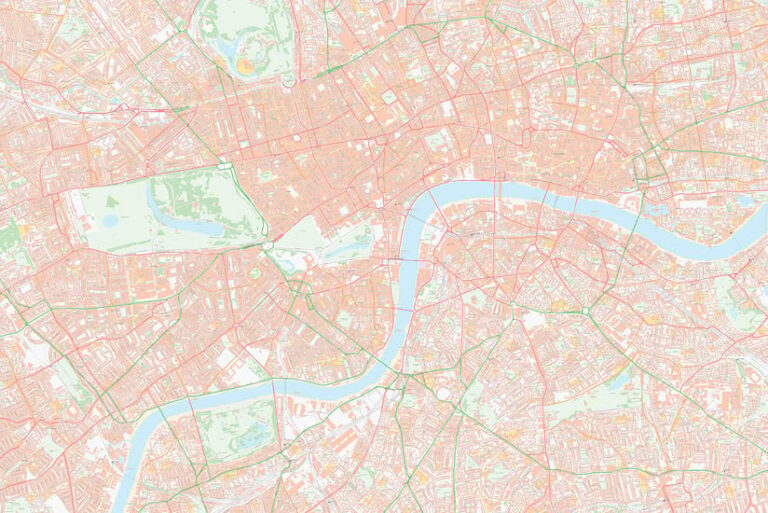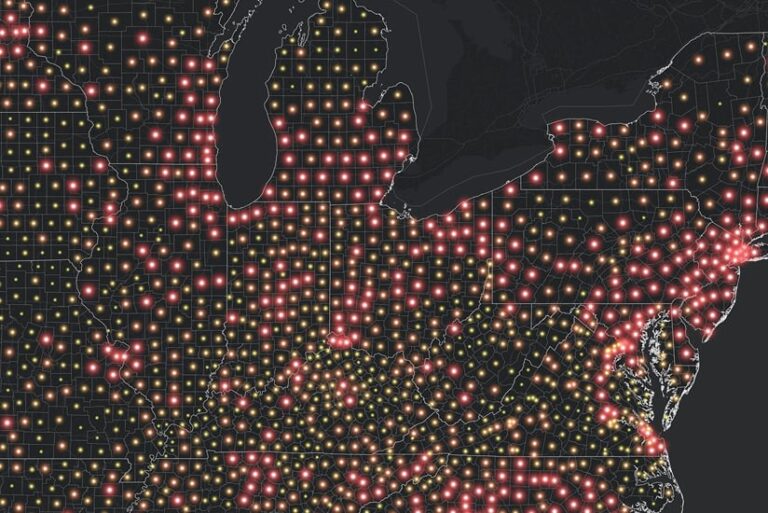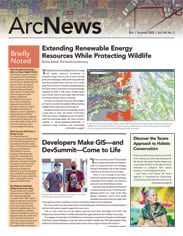Maps are generally seen as reliable information sources. Why? Because most maps that are recognized as authoritative adhere to standards and quality control guidelines.
As mapping software has evolved to produce higher-quality maps at lower costs, geographic data has become more commonly available. Much of it is free and accessible in formats that are ready to be mapped. In some respects, this means that it is easier to make authoritative maps that adhere to standards and promote accountability. But it also means that there is an opportunity for untrained, ignorant, or even malevolent mapmakers to use low-cost or free mapping software and free data to create inaccurate or intentionally misleading maplike products.

To the undiscerning eye, unreliable maps may look just like authoritative maps. This opens the door for maps to be used to spread misinformation. The onus is on the professional mapmaking community to ensure the integrity of maps and their underlying data. Which is why ethics in mapmaking and cartography is an important conversation to be having right now.
The Mapmaker’s Mantra
At the 2021 Esri User Conference (Esri UC), which was held virtually, there was a panel discussion about maps and storytelling. The participants were Esri president Jack Dangermond, journalist and contributing writer to The Atlantic James Fallows, and former president and CEO of the National Geographic Society Gary Knell. In their free-ranging conversation, the three speakers talked about the increasing reach of GIS and the implications of that. They also broached how to ensure the appropriate use of GIS tools, given the growth in dissemination of false information.
As the global market leader in GIS, Esri has an obligation to take a stand on how maps get made and used in the modern world. Additionally, the company seeks to contribute to a broader discussion about the ethical use of GIS in all endeavors in which ArcGIS technology is used—not just mapmaking.
This led Esri research cartographer Dr. Aileen Buckley, Esri storytelling program manager Allen Carroll, and Esri director of product engineering Clint Brown to craft The Mapmaker’s Mantra, a set of guiding principles for ethical mapmaking. Available on ArcGIS Blog, it is a short list of simple instructions for making maps that are accurate, justifiable, and thorough.
The mantra consists of the following principles:
- Be honest and accurate: Communicate information in the most precise and understandable way possible. Strive for veracity and verifiability.
- Be transparent and accountable: Take responsibility for your work and be open about your sources and decisions. Neither speed nor format takes the place of accountability.
- Minimize harm and seek to provide value: Treat sources, subjects, colleagues, and members of the public with respect. Promote equity, inclusion, and empathy. Make useful maps that increase understanding.
- Be humble and courageous: Disclose when you get something wrong, and gently point out others’ errors. Admit when you don’t know something, and considerately let others know when their knowledge or skills are lacking.
And this is just a start. The Mapmaker’s Mantra is Esri’s first attempt at describing what ethical mapmaking looks like.
Further Action from the Wider GIS Community
Over the long term, Esri seeks to foster additional discussion about what ethics in mapmaking looks like and encourage concomitant action from other prominent groups in the GIS community.
The International Cartographic Association (ICA), for example, is well positioned to take a leadership role on this topic, offering broad perspectives from cartographers all over the world and encouraging wider adoption of these tenets. The ICA’s current president, Tim Trainor, will be presenting a session at this year’s Esri UC that centers on ethics in cartography. He also plans to take this work forward through his professional contacts, other organizations he is involved in, and current and future writing projects.
Several activities that aim to advance a code of ethics in cartography have already taken place or are planned for the near future. At its annual meeting in February, the American Association of Geographers (AAG) hosted a panel to facilitate discussion of the topic among members of many national and international cartographic societies, including the ICA, the International Map Industry Association (IMIA), the Cartography and Geographic Information Society, the North American Cartographic Information Society, and the British Cartographic Society. Additional organizations expressed interest in participating in the conversation, but the session was only open to those registered for the meeting.

More discussion is scheduled to take place at several upcoming events as well, including at the IMIA Mapping Leaders Forum in Denver, Colorado, in June; EuroCarto 2022 in Vienna, Austria, in September; and AutoCarto 2022 at Esri in Redlands, California, in November. The goal at the IMIA forum is to develop a statement on ethics in the mapping industry, and the ensuing events will further the conversation. The ultimate objective is to have cartographic societies collectively draft a code of ethics for mapmaking—one that is inclusive of various perspectives and ensures widespread adoption.
Take the Next Steps at the Esri UC
Defining the ethics of mapping reaches beyond developing a code of ethics, however. It is indeed a very broad and complex topic.
Considering this, two sessions that cover the subject will be offered at the Esri UC on Wednesday, July 13. One will be a discussion of the fundamentals of ethical mapmaking, and the other will explore one of those elements in depth: the practice of making maps.
The first session, called Elements of Ethical Cartography: Refining a Mapmaker’s Mantra, will be held from 1:00 p.m. to 2:00 p.m. (Pacific time) in Room 3 of the San Diego Convention Center. In it, an in-person panel—consisting of Carroll, Buckley, Trainor, and Esri’s Mark Cygan—will present the details of The Mapmaker’s Mantra and go into the motivations that led to its creation. Most of the session will be an open discussion about the mantra, with the goal of moving toward a consensus on what the essential elements of ethical mapmaking are.
The second session, The Ethics of Making Maps, will be held in the same room from 2:30 p.m. to 3:30 p.m. (Pacific time). It will feature Esri’s Charlie Fitzpatrick, Dr. Joseph Kerski, Dr. Kenneth Field, and Lisa Berry as panelists, who will go over some tenets of mapmaking that attendees can apply to their work to make more honest and authoritative maps. The speakers will demonstrate how mapmakers imbue their work with different messages and share resources to help participants better understand ethics in mapping.
These sessions aim to be informative and enlightening, and anyone who is attending the Esri UC in person is encouraged to take part.

